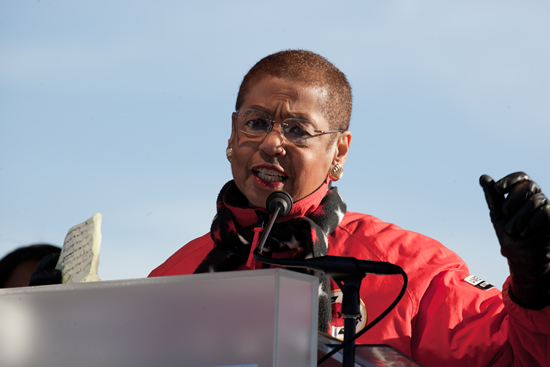The War on Women’s Freedom
Jennifer Marshall /
Isn’t religious freedom for women too? So why did Representative Carolyn Maloney (D–NY) and Delegate Eleanor Holmes Norton (D–DC) walk out of a committee hearing on the subject, claiming it was disregarding women?
On Thursday, House Oversight and Government Reform chairman Darrell Issa (R–CA) held a hearing on a topic that has deeply concerned many Americans in recent weeks: Obamacare’s trampling of religious liberty. But some committee members seemed more interested in engaging in political theater than complying with required committee hearing process so that a serious constitutional issue could get some due consideration.
Disregarding committee rules, Maloney and Norton called at the outset of the hearing for the immediate seating of a female law student alongside the clergy on the first panel. As Issa explained, the proposed witness (who came prepared with testimony about a friend’s serious health problem) did not have the relevant credentials or appropriate contribution requested for the hearing’s focus on religious liberty. Nor was her name submitted for the panel in keeping with the committee’s requirement for advance notice, according to Issa: “I cannot, and will not, arbitrarily take a majority or minority witness if they do not have the appropriate credentials…and if we cannot vet them in a timely fashion.”
The opening challenges (“Where are the women?”) and later press interviews by Maloney and Norton obscured the fact that women indeed testified at the hearing.
Maloney told MSNBC that there were “so few women there—practically zero.” With two female witnesses among 10 total, however, that can hardly be excused as a rounding error. (See testimony of Allison Dabbs Garrett, senior vice president for academic affairs at Oklahoma Christian University, and Laura Champion, M.D., medical director and physician at Calvin College.)
Let’s be clear: Liberals are fighting to force religious employers to provide health insurance coverage for “no-cost” abortion-inducing drugs and contraception even if it conflicts with their beliefs. Violation of religious liberty is the central problem—and it’s just the latest in the list of Americans’ grievances against Obamacare.
Particularly offensive is the requirement that religious hospitals, charities, and schools must provide and pay for insurance coverage for abortion-inducing drugs—including the morning-after pill and the week-after drug, ella. Demand for these so-called “emergency contraceptives” is fueled in part by the casual sex culture of hooking up—sexual encounters outside the context of commitment, sometimes between complete strangers or mere acquaintances.
It’s not a scene that empowers women, contrary to what feminists might like to argue. Former Washington Post journalist Laura Sessions Stepp chronicled the sad experiences of young women in the hook-up culture in her 2008 book Unhooked: How Young Women Pursue Sex, Delay Love and Lose at Both.
Young women today, she writes, “are trying to make sense of what is arguably the most confusing sexual landscape any generation has ever faced.” They’re not getting much help. Most sex education pushes young women into this chaos and tells them that contraception will provide adequate protection. This puts incredible pressure on those who have the most at risk in the casual-sex scene.
That makes it particularly hard to understand why Maloney and Norton protested at the sight of male religious leaders testifying along with women Thursday about the need to protect religious beliefs—including beliefs concerned with creating a culture in which women do not face such a negative environment when it comes to their health and relationships. These same religious beliefs teach the equal dignity of all human life, male and female, a basis that feminists would be loathe to abandon if they thought seriously about the consequences.
Religious liberty has been called our first freedom—and that goes for women, too. If it begins to erode, the whole framework of liberty is in danger. That’s why Obamacare’s unholy trinity of attacks on freedom—the free exercise of religion, free enterprise, and individual freedom, as Charles Krauthammer pointed out this week—is a war on freedom that should concern all Americans, and particularly women.

